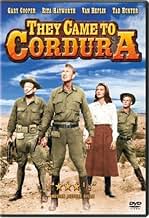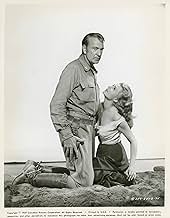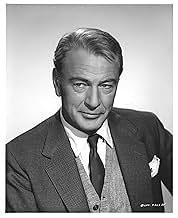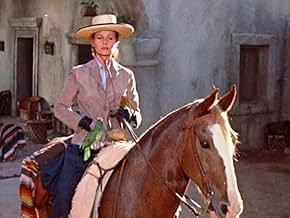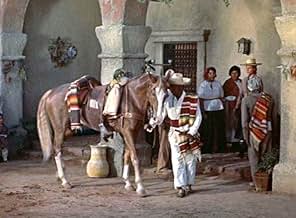IMDb RATING
6.4/10
2.6K
YOUR RATING
An army major, himself guilty of cowardice, is asked to recommend soldiers for the Congressional Medal of Honor during the Mexican Border Incursion of 1916.An army major, himself guilty of cowardice, is asked to recommend soldiers for the Congressional Medal of Honor during the Mexican Border Incursion of 1916.An army major, himself guilty of cowardice, is asked to recommend soldiers for the Congressional Medal of Honor during the Mexican Border Incursion of 1916.
- Director
- Writers
- Stars
- Awards
- 1 win & 1 nomination total
Jim Bannon
- Capt. Paltz
- (as James Bannon)
Wendell Hoyt
- Cavalry Trooper
- (uncredited)
- Director
- Writers
- All cast & crew
- Production, box office & more at IMDbPro
6.42.6K
1
2
3
4
5
6
7
8
9
10
Featured reviews
Imperfect, overlong and superficially wordy but still an interesting story
Angered by the US President Wilson's increasing support the rising Mexican political leader General Carranaza, the former US darling Francisco Villa sends his group of rebels to raid a town in New Mexico before coming back over the border. Enraged by the audacity of the man, Wilson orders his troops across the border to catch and/or kill Villa. Part of the group he sends is Major Thomas Thorn, who has been given the job of assessing the men for possible awards a comfortable job given to him by Colonel Rogers, a friend of his father. Fascinated by the nature of heroes, Thorn finds himself given command of a small group of them when he refuses to put Rogers forward for a citation. Thorn is keen to get to know more of the men but, with a captured woman in tow, the men are not as simple as their proposed medals would suggest.
Despite pretty much ignoring the interesting history that serves as a backdrop to this film, this is actually still quite an interesting film that was a lot rawer than I expected it to be, given the period in which it was made. In the early stages it was too basic and I worried that the whole thing would be as clunky as Thorn's early questioning of some of his "heroes", but gradually it got better as it went on and simple lines such as hero and coward were eroded away. This is not to say it is brilliant because it most certainly is not but it is certainly interesting for what it tries to do. It doesn't help that the script really labours the surface but lacks the ability to go significantly deep to really make an impact. However even with this, it was still interesting enough to hold me and I did enjoy the solid if simplistic moral debate that it delivered.
Rossen and his cinematography do great work with the wide-open landscapes but the former must also carry the can for not bringing more emotion out of the script consistently. As a result the cast do well without really excelling with nobody guiding them deeper, this is really what I could have expected. Cooper is as solid as usual with what I suppose was a brave role for him to take. He deals with it well but perhaps wasn't good enough to really convince in layers although he is superficially good enough. Hayworth doesn't have that great a character and her delivery occasionally gets a bit too over-the-top when asked to deliver more emotionally charged material, she has impact but I was looking for more pain and fear. The support cast work well with what they have been given to do. Conte, Heflin, Keith and Hunter are among those giving solid turns in support of Cooper and the raw story.
Overall then this is not a great film but it is an interesting one. Despite being over 45 years old it is surprising raw and willing to turn away from the simple lines of courageous and cowardly towards something that is much realer and well conceived. It doesn't go deep enough but it is strong on the surface could easily have been tighter and dropped 20-30 minutes from the running time but is still worth a look for what it does do well.
Despite pretty much ignoring the interesting history that serves as a backdrop to this film, this is actually still quite an interesting film that was a lot rawer than I expected it to be, given the period in which it was made. In the early stages it was too basic and I worried that the whole thing would be as clunky as Thorn's early questioning of some of his "heroes", but gradually it got better as it went on and simple lines such as hero and coward were eroded away. This is not to say it is brilliant because it most certainly is not but it is certainly interesting for what it tries to do. It doesn't help that the script really labours the surface but lacks the ability to go significantly deep to really make an impact. However even with this, it was still interesting enough to hold me and I did enjoy the solid if simplistic moral debate that it delivered.
Rossen and his cinematography do great work with the wide-open landscapes but the former must also carry the can for not bringing more emotion out of the script consistently. As a result the cast do well without really excelling with nobody guiding them deeper, this is really what I could have expected. Cooper is as solid as usual with what I suppose was a brave role for him to take. He deals with it well but perhaps wasn't good enough to really convince in layers although he is superficially good enough. Hayworth doesn't have that great a character and her delivery occasionally gets a bit too over-the-top when asked to deliver more emotionally charged material, she has impact but I was looking for more pain and fear. The support cast work well with what they have been given to do. Conte, Heflin, Keith and Hunter are among those giving solid turns in support of Cooper and the raw story.
Overall then this is not a great film but it is an interesting one. Despite being over 45 years old it is surprising raw and willing to turn away from the simple lines of courageous and cowardly towards something that is much realer and well conceived. It doesn't go deep enough but it is strong on the surface could easily have been tighter and dropped 20-30 minutes from the running time but is still worth a look for what it does do well.
faux flaws?
This is in response to comments on 'They Came to Cordura' regarding its dramatic weakness and flawed camera work and editing.
The flaws may be real, but they might not be the fault of the filmmaker (writer-director Robert Rossen).
Reportly, the film was taken out of Rossen's hands by the studio and drastically cut and re-cut. The director's original version, about 1/2 hour longer, was apparently much better, making much more dramatic sense.
Further, the movie was shot in CinemaScope, and comments on its poor cinematography and editing are likely based on viewing a crude pan & scan video copy. Such artificial flaws are common with panned & scanned widescreen movies.
.
The flaws may be real, but they might not be the fault of the filmmaker (writer-director Robert Rossen).
Reportly, the film was taken out of Rossen's hands by the studio and drastically cut and re-cut. The director's original version, about 1/2 hour longer, was apparently much better, making much more dramatic sense.
Further, the movie was shot in CinemaScope, and comments on its poor cinematography and editing are likely based on viewing a crude pan & scan video copy. Such artificial flaws are common with panned & scanned widescreen movies.
.
They Came to the Point
Glendon Swarthout's brutal, excellent novel receives a handsome, intelligent, and staid Hollywood adaptation---toned down and with a happier ending and less savage sense of irony. Robert Rossen isn't able to keep the film moving. His direction is heavy and without pace, almost formal---a mistake in a story where desperate people are pushed so hard they crack up. The screenplay is relatively faithful to the book but smooths off the rough edges, as expected in an early 60s Hollywood feature. What results is a digest of the book, with themes turned into talking points conveyed through on-the-nose dialogue, especially in the new material at the end.
As usual in his later roles Gary Cooper conveys pained dignity, but he's too old and difficult to accept as a coward. A 40-something Jimmy Stewart, with his reserves of neurosis, or Henry Fonda, whose rectitude could shade into unbending mania, would have been better choices. Rita Hayworth is perfect as the middle-aged woman of ill-repute, while Van Heflin is impressively scummy but not physically imposing enough as Sgt. Chawk. Tab Hunter convinces as a careerist Lieutenant but can't convey seediness. The other soldiers are one note and less vivid than in the book, which is more worth your time.
As usual in his later roles Gary Cooper conveys pained dignity, but he's too old and difficult to accept as a coward. A 40-something Jimmy Stewart, with his reserves of neurosis, or Henry Fonda, whose rectitude could shade into unbending mania, would have been better choices. Rita Hayworth is perfect as the middle-aged woman of ill-repute, while Van Heflin is impressively scummy but not physically imposing enough as Sgt. Chawk. Tab Hunter convinces as a careerist Lieutenant but can't convey seediness. The other soldiers are one note and less vivid than in the book, which is more worth your time.
A good film with a very subtle message
I would like to add another comment from a little different viewpoint than what has been expressed at IMDb so far. A little film history first- this movie appeared in 1959 and was based on a book with the same title that had come out about a year earlier. Now, in this era (late 1950s) the Westerns ruled TV as well as the movies. It was the popular genre at the time. Also popular at the time were "war movies" that depicted United States troops in action in WWII. That war was pretty recent in memory then and had been quite popular and, of course, a lot of people still remembered our involvement and victory in the first fracas in 1917-1918. Now, how could an author tie in our military's achievements in the World Wars with the Old West? The World Wars were fought in Europe and Asia (Atlantic and Pacific for you Navy people) and neither had any real connection with the American West. The best that anybody could do to link up the two popular genres was to bring up the expedition in 1916 that sent the Army under General Pershing into the country of Mexico to hunt down or at least slow down the various Mexican rebel factions such as the one under Pancho Villa. This is the one time in history that, by any stretch of the imagination, the modern U.S. military was involved in a part of the "Old West". In this time, the "Old West" still lived in Mexico in 1916 plus the fact the U.S. military still used mounted calvary; though they were not going to take them to Europe the next year. However, the U.S. military did take General Pershing and Capts Douglas McArthur and George Patton to Europe the next year so yes, in a way the WWI (perhaps even the WWII) military did fight in the Old West due to this military expedition. Hence the linkage; and why this time and military action gets a disproportionate amount of attention in movies and TV to this date. The trouble with this premise of the Old West calvary in Mexico is that you have people acting in a way that is simply not believable for that era. The plot is very suspicious. You have five men who find they are going to be submitted for the Medal of Honor- an award that was quite well known even then. Perhaps one or even two of the men might not want the award and could conceivably threaten the nominating officer, but that is highly unlikely. Some men, in the past, have not wanted to be awarded the medal but usually because they sincerely felt they did not perform any action that any other man in their unit would not have done. And even when an individual truly did not want the medal, they never threaten the life of a superior officer. To have five men (one of them an officer) nominated for that most illustrious of medals, gang up on the nominating officer is simply so far fetched that only Hollywood could have even conceived of it. In real life, Captain McArthur was nominated for the medal for his actions in Mexico. He did not receive it due to some political reasons; nevertheless the fact remains that he did not threaten the nominating officer. This, by itself, destroys the entire believability of the character of "Lt William Fowler" in this movie. The rest of the characters are equally unbelievable in the context of the movie- the "act of cowardice" of Maj Thomas Thorn (sorry, but Gary Cooper was just a little too old to portray even a passed over Major) was hardly cowardice but simply proper tactics- take cover until you find out where the enemy fire is coming from. If you can't find it or do not have the proper weapon then stay put. Don't get killed unnecessarily. In fact, the proper response of Maj Thorn to Cpl Milo Trubee, when Trubee threatened to blackmail him, would have been something of the nature of "up yours Trubee" as Trubee hardly had anything to blackmail the Major with. Actually, this movie used the military only because of the high respect in society the military had in the 1950s (and does again today, in fact); hence the more dramatic juxtaposition. Now, having wrote all that- let me explain the true moral of this movie and why I like it so much. The military has high respect in society even though, by and large, the military performs duties that are dirty and hard work. In fact, military duty can be depressingly boring and monotonous. Now, in other parts of society there are people who are doing jobs that are at least equally dirty and hard, boring and monotonous. Unlike the military, those people generally do not get much respect from society. For some reason the upper class (and I am in that group) tends to ignore or turn their backs to the lower class workers. And, then, we wonder why this group of people will act belligerent and tough. Well, they may already be that way. Yet, I have seen decent people turn bad due to the disrespect given to them by others. I do not like to see that occur even though I cannot say that I myself have not been disrespectful in the past to people on the "fringe" of society. This movie, by using military personnel in a proxy manner, explores this deeper issue; basically, are there heroes or at least potential heroes amongst the people that we usually ignore? The thoughtful exploration of that question redeems the error in the movie that I previously mentioned. It is a good movie; I recommend that everybody watch it at least once when they are young as it explores the human psyche in much the same way that Major Thorn does.
"Not Much Of A Story. Not Much Of A War."
What exactly is courage? How can a man know if he will act bravely when the supreme test comes? These are the questions occupying the mind of Major Tom Thorn as he escorts a detail of medal-winning troopers out of Mexico and back to the USA. "What made you do it?" is Thorn's repeated question to the heroes. He once lost his nerve in combat, and his subsequent life has been one long meditation on the nature of bravery, and how a man comes by it. In the wilderness of Mexico, Thorn's moral fibre is put to the sternest of tests.
Set in 1916, the film centres on a US military expedition deep into Mexico, a punitive response to Pancho Villa's raid on American territory. Gary Cooper plays Thorn, and though he invests his character with a certain quiet dignity, he can hardly be accused of acting.
Thorn is despatched back to the USA with a small group of men, each of whom is to be decorated for valour. As the Cavalry's Awards Officer, Thorn will have to prepare citations, and he obsessively quizzes the men about why they did what they did, how they felt at the time, and so forth.
Typically for a film of its era, "Cordura" assembles a melange of ethnic tokens, throws them into a difficult situation, then concentrates on the tensions and confrontations which result. Richard Conte is Truby, the crafty latin type, and Van Heflin plays Chawk, the angosaxon brute. Dick York is Renziehausen, the German American from (where else?) Wisconsin. Thorn is hoping to learn the secret of courage from his motley crew, but discovers that the answer to his question can only be found within himself.
Nice angles are developed to open out the plot's basic premise. A cavalry charge against the Mexicans looks like dashing American heroism, but might be no more than cynical fakery on the part of medal-hunting Colonel Rogers. Chawk might be an unfeeling ruffian rather than a hero. The arrival in the group of Mrs. geary (Rita Hayworth) complicates the issues, because the presence of a beautiful woman causes the men's interests to diverge.
The Mexican terrain is spectacular, and the film's central proposition is an interesting one, but the end product is so-so. It is difficult to warm to Cooper as an actor, or indeed to his character. Tab Hunter (as Lieutenant Fowler) goes way over the top. Thorn's sudden perking-up beside the rail track is a ludicrous event.
Verdict - Would-be essay on the wellsprings of human courage peters out into humdrum adventure yarn.
Set in 1916, the film centres on a US military expedition deep into Mexico, a punitive response to Pancho Villa's raid on American territory. Gary Cooper plays Thorn, and though he invests his character with a certain quiet dignity, he can hardly be accused of acting.
Thorn is despatched back to the USA with a small group of men, each of whom is to be decorated for valour. As the Cavalry's Awards Officer, Thorn will have to prepare citations, and he obsessively quizzes the men about why they did what they did, how they felt at the time, and so forth.
Typically for a film of its era, "Cordura" assembles a melange of ethnic tokens, throws them into a difficult situation, then concentrates on the tensions and confrontations which result. Richard Conte is Truby, the crafty latin type, and Van Heflin plays Chawk, the angosaxon brute. Dick York is Renziehausen, the German American from (where else?) Wisconsin. Thorn is hoping to learn the secret of courage from his motley crew, but discovers that the answer to his question can only be found within himself.
Nice angles are developed to open out the plot's basic premise. A cavalry charge against the Mexicans looks like dashing American heroism, but might be no more than cynical fakery on the part of medal-hunting Colonel Rogers. Chawk might be an unfeeling ruffian rather than a hero. The arrival in the group of Mrs. geary (Rita Hayworth) complicates the issues, because the presence of a beautiful woman causes the men's interests to diverge.
The Mexican terrain is spectacular, and the film's central proposition is an interesting one, but the end product is so-so. It is difficult to warm to Cooper as an actor, or indeed to his character. Tab Hunter (as Lieutenant Fowler) goes way over the top. Thorn's sudden perking-up beside the rail track is a ludicrous event.
Verdict - Would-be essay on the wellsprings of human courage peters out into humdrum adventure yarn.
Did you know
- TriviaAlthough Gary Cooper was 57, his character Major Thorn was forty years old according to the novel. Early in the film it is mentioned that Thorn's father had recently been killed while still on active service.
- GoofsMajor Thorn improperly salutes Colonel DeRose in the opening scene when he is dismissed. He should have saluted and held his salute until it was acknowledged. Instead, he lowers his arm even before Colonel Rose acknowledges it.
- Quotes
Major Thomas Thorn: Did you ever see the Medal of Honor?
Private Renziehausen: No, Sir.
Major Thomas Thorn: It's the most beautiful decoration of all, as it should be. I'd trade an ear for one any time, two in fact.
Private Renziehausen: Excuse me, Sir, but I'd rather have the ear.
- Crazy creditsOpening credits prologue:
On the night of March 8th, 1916, a large mounted force of Mexican rebels under Pancho Villa crossed the American Border and attacked the town of Columbus, New Mexico, killing and wounding both American civilians and soldiers.
As a result of this action,the United States Army sent an expedition into Mexico with orders to capture Villa and disperse his forces.
It was during this campaign that one man, an United States Army officer,was forced to come face to face with two of the great fundamental questions that affect mankind:
What Is Courage? What Is Cowardice?
This is the story of his search for an answer.
- ConnectionsFeatured in Stars of the Silver Screen: Rita Hayworth (2011)
- How long is They Came to Cordura?Powered by Alexa
Details
Box office
- Budget
- $4,000,000 (estimated)
- Runtime
- 2h 3m(123 min)
- Color
- Aspect ratio
- 2.35 : 1
Contribute to this page
Suggest an edit or add missing content



